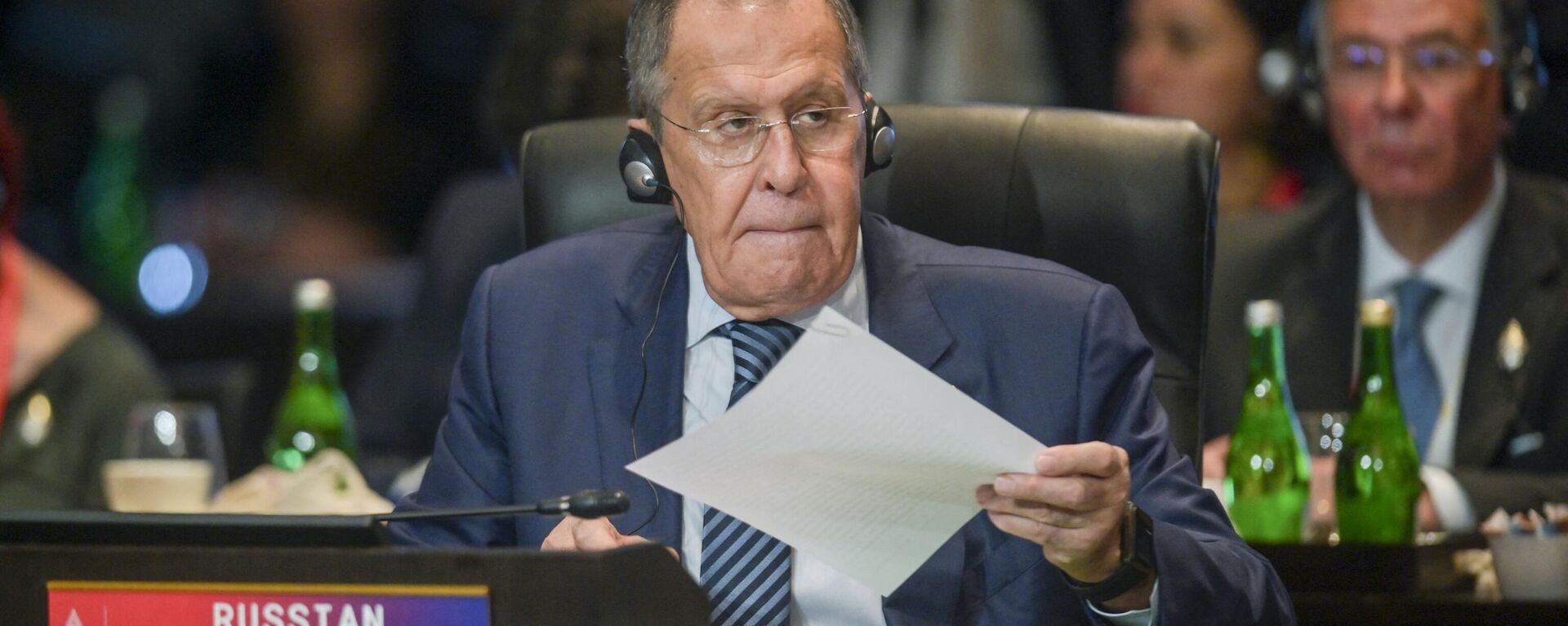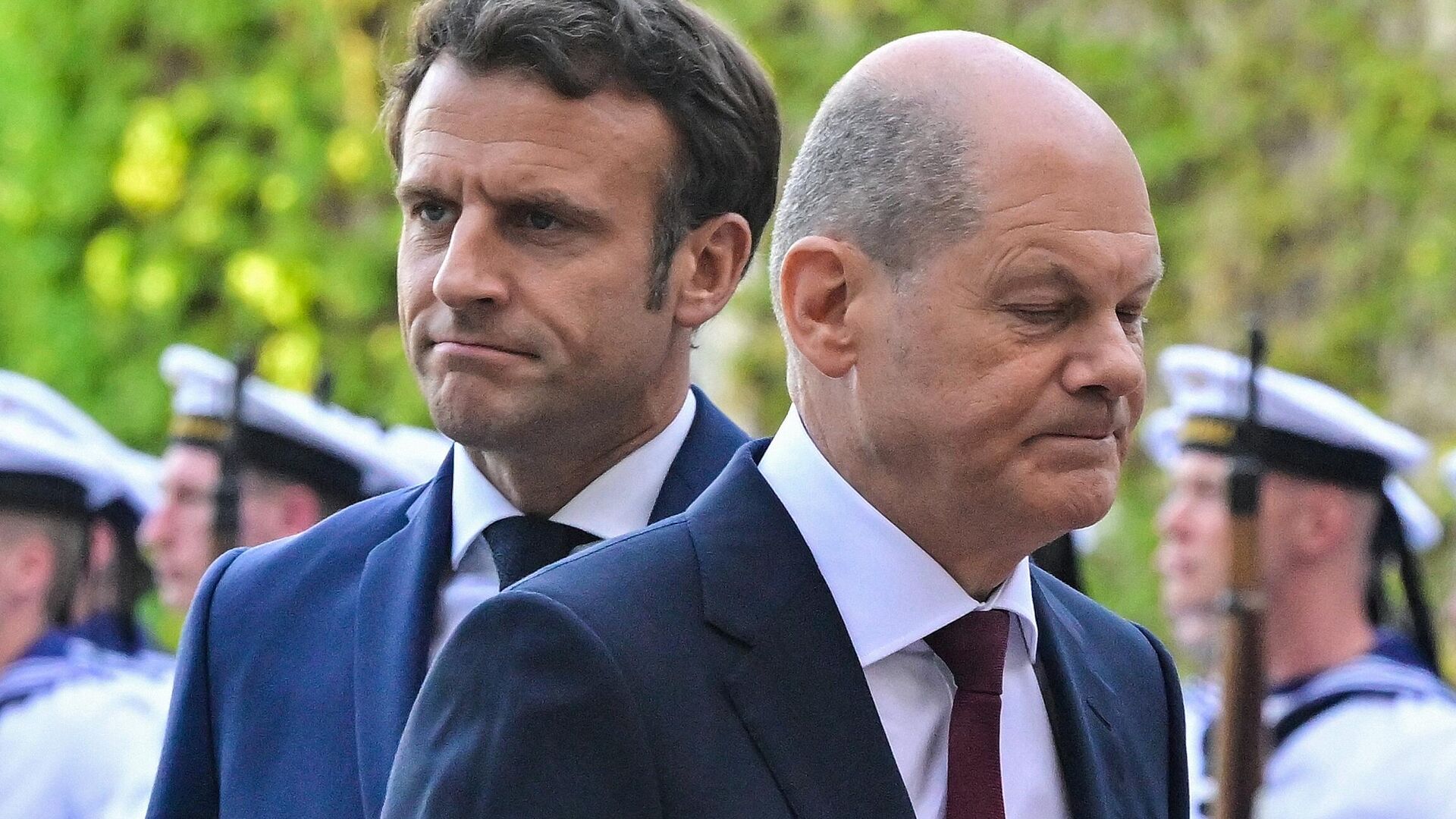https://sputnikglobe.com/20221207/paris-berlin-relations-why-do-the-two-remain-at-odds--1105158375.html
Paris-Berlin Relations: Why Do the Two Remain at Odds?
Paris-Berlin Relations: Why Do the Two Remain at Odds?
Sputnik International
Defense and economic issues may exacerbate existing tensions between France and Germany in the near future. 07.12.2022, Sputnik International
2022-12-07T16:27+0000
2022-12-07T16:27+0000
2022-12-07T16:27+0000
world
germany
france
relations
gas pipeline
tension
emmanuel macron
olaf scholz
https://cdn1.img.sputnikglobe.com/img/07e6/0c/07/1105157992_0:120:2305:1417_1920x0_80_0_0_1e6bbde17cd85d513019d0b58d744d75.jpg
French Foreign Minister Catherine Colonna did not think twice before arguing that both President Emmanuel Macron and German Chancellor Olaf Scholz share the view that the relationship between Paris and Berlin remains a "driving force" for Europe in her recent comments. It seems, however, that the two’s current relations are not that smooth. Here’s why.Economy Paris opposes the resumption of the construction of the Midi-Catalonia (MidCat) gas pipeline across the territories of Spain and France, something that Germany sees as a means to reduce the EU's dependence on Russian gas amid western sanctions that were slapped on Moscow shortly after it launched its ongoing special military operation in Ukraine on February 24.France insists that the €3 billion ($3.1 billion) delayed project to deliver gas from Spanish LNG terminals to central Europe is not financially viable, urging German authorities to prove its usefulness in addressing the energy crisis and strengthening green energy infrastructure.Speaking on the sidelines of an EU summit in October, French President Emmanuel Macron and Spanish Prime Minister Pedro Sanchez clinched an agreement to replace the MidCat pipeline with a new “green energy corridor” project.It seems that Germany’s energy transition-related policy known as Energiewende, which focuses on developing renewables, also adds to the French-German discrepancies. Berlin relies heavily on natural gas and coal during a transition period while it phases out nuclear energy altogether this year, while Paris remains committed to nuclear power.Ukraine ConflictUS experts argue that the armed conflict in Ukraine that comes amid the Russian special operation has exacerbated a "fundamental rift" between Berlin and Paris, "causing frictions on the part of both sides.”The analysts argued in this context that one of Germany's headaches was the realization of the fact that Europe's security is currently ensured by NATO rather than France, which previously called for the formation of a single EU army. They added that Berlin also realized that although President Macron has interesting ideas about Europe's "strategic autonomy", he is yet to clarify what it means and under whose leadership this autonomy should take shape.That's why Chancellor Scholz's new priority is to improve Berlin's relationship with Washington, according to the experts.Defense Troubles According to a US news outlet, Germany, which earlier created a €100 billion ($105 billion) special fund to modernize its military, has spent much of the money on the fifth-generation US warplane F-35. This comes amid the freezing of a spate of joint Franco-German arms cooperation projects in a sign of deepening bilateral tensions.Apart from stalling bilateral arms collaboration programs, Germany angered France by launching a Central European missile defense initiative with 14 countries, excluding Southern Europe.Paris doesn’t take part in the so-called "European Sky Shield Initiative," which brings together the UK, Belgium, the Netherlands, Norway and Finland, along with many countries on Europe's eastern flank, such as Bulgaria, Romania, the Czech Republic, Estonia, Latvia, Lithuania, Slovakia, Slovenia and Hungary.On the other hand, Scholz's reluctance to support Macron's idea of maintaining European sovereignty and common defense may also further add to French-German tensions.Delayed SummitThe October 26 Franco-German ministerial summit to relaunch bilateral military cooperation programs had been finally postponed until January, reportedly due to scheduling issues, in a move initiated by Macron and Scholz.In a sign that Berlin and Paris resolving their differences may prove a hard nut to crack, an opinion poll conducted by the oldest French newspaper indicated that most respondents in France don’t believe in a stable Franco-German alliance.
https://sputnikglobe.com/20221115/lavrov-other-countries-realize-washington-provoked-ukraine-conflict-despite-us-claims-1104205034.html
germany
france
Sputnik International
feedback@sputniknews.com
+74956456601
MIA „Rosiya Segodnya“
2022
Oleg Burunov
https://cdn1.img.sputnikglobe.com/img/07e4/09/0b/1080424846_0:0:2048:2048_100x100_80_0_0_3d7b461f8a98586fa3fe739930816aea.jpg
Oleg Burunov
https://cdn1.img.sputnikglobe.com/img/07e4/09/0b/1080424846_0:0:2048:2048_100x100_80_0_0_3d7b461f8a98586fa3fe739930816aea.jpg
News
en_EN
Sputnik International
feedback@sputniknews.com
+74956456601
MIA „Rosiya Segodnya“
Sputnik International
feedback@sputniknews.com
+74956456601
MIA „Rosiya Segodnya“
Oleg Burunov
https://cdn1.img.sputnikglobe.com/img/07e4/09/0b/1080424846_0:0:2048:2048_100x100_80_0_0_3d7b461f8a98586fa3fe739930816aea.jpg
french-german relations, midi-catalonia (midcat) gas pipeline, ukraine conflict, ministerial summit between france and germany
french-german relations, midi-catalonia (midcat) gas pipeline, ukraine conflict, ministerial summit between france and germany
Paris-Berlin Relations: Why Do the Two Remain at Odds?
Defense and economic issues may exacerbate existing tensions between France and Germany in the near future.
French Foreign Minister Catherine Colonna did not think twice before arguing that both
President Emmanuel Macron and German Chancellor Olaf Scholz share the view that the relationship between Paris and Berlin remains a "driving force" for Europe in her recent comments. It seems, however, that the two’s current relations are not that smooth. Here’s why.
Paris opposes
the resumption of the construction of the Midi-Catalonia (MidCat) gas pipeline across the territories of Spain and France, something that Germany sees as a means to reduce
the EU's dependence on Russian gas amid western sanctions that were slapped on Moscow shortly after it launched its ongoing special military operation in Ukraine on February 24.
France insists that the €3 billion ($3.1 billion) delayed project to deliver gas from Spanish LNG terminals to central Europe is not financially viable, urging German authorities to prove its usefulness in addressing the energy crisis and strengthening green energy infrastructure.
Speaking on the sidelines of an EU summit in October, French President Emmanuel Macron and Spanish Prime Minister Pedro Sanchez clinched an agreement to replace the MidCat pipeline with a new “green energy corridor” project.
It seems that Germany’s energy transition-related policy known as Energiewende, which focuses on developing renewables, also adds to the French-German discrepancies. Berlin relies heavily on natural gas and coal during a transition period while it phases out nuclear energy altogether this year, while Paris remains committed to nuclear power.
US experts argue that the armed conflict in Ukraine that comes amid
the Russian special operation has exacerbated a "fundamental rift" between Berlin and Paris, "causing frictions on the part of both sides.”

15 November 2022, 09:46 GMT
The analysts argued in this context that one of Germany's headaches was the realization of the fact that Europe's security is currently ensured by NATO rather than France, which previously called for the formation of a single EU army. They added that Berlin also realized that although President Macron has interesting ideas about Europe's "strategic autonomy", he is yet to clarify what it means and under whose leadership this autonomy should take shape.
That's why Chancellor Scholz's new priority is to improve Berlin's relationship with Washington, according to the experts.
According to a US news outlet, Germany, which earlier created a €100 billion ($105 billion) special fund to modernize its military, has spent much of the money on the fifth-generation US warplane F-35. This comes amid the freezing of a spate of joint Franco-German arms cooperation projects in a sign of deepening bilateral tensions.
Apart from stalling bilateral arms collaboration programs, Germany angered France by launching a Central European missile defense initiative with 14 countries, excluding Southern Europe.
Paris doesn’t take part in the so-called "European Sky Shield Initiative," which brings together the UK, Belgium, the Netherlands, Norway and Finland, along with many countries on Europe's eastern flank, such as Bulgaria, Romania, the Czech Republic, Estonia, Latvia, Lithuania, Slovakia, Slovenia and Hungary.
On the other hand, Scholz's reluctance to support Macron's idea of maintaining European sovereignty and common defense may also further add to French-German tensions.
The October 26 Franco-German ministerial summit to relaunch bilateral military cooperation programs had been finally postponed until January, reportedly due to scheduling issues, in a move initiated by Macron and Scholz.
German government spokesman Steffen Heberstreit admitted that there are a number of topics, including those pertaining to defense and energy, where both sides have yet to arrive at a political accommodation.
In a sign that Berlin and Paris resolving their differences may prove a hard nut to crack, an opinion poll conducted by the oldest French newspaper indicated that most respondents in France don’t believe in a stable Franco-German alliance.






